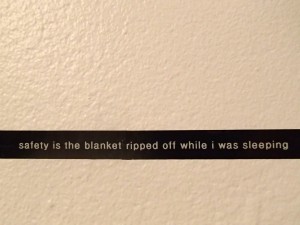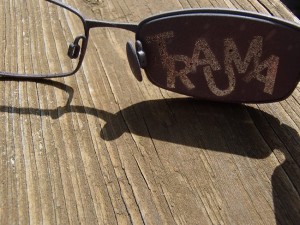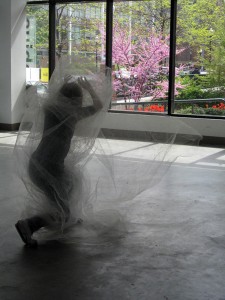-
“She’s such a victim.”
I hear those words and they make me me cringe. I recoil and get small inside no matter when or how it is said.
“He’s such a perpetrator” I’ve never heard anyone say.
“She’s such a victim” though. That gets some play. It’s never a compliment. It’s not even neutral. It’s usually said with disdain.
Why is there less scrutiny on the offender? Why don’t we ask:
“What up with the frequent perpetration?”
“Why so relentlessly perpy?”
“He must be really attached to his perp story. So tiresome. So sad.”
What gives? When did we start measuring if someone is a good or bad victim rather than keeping people safe instead?
I am not a victim, as in adjective, personality type or horoscope. Victim is not the sun I was born under or in my rising sign. Nope.
I am not a victim. I never was…. I was victimized. There’s a difference.
That’s about what was done to me, not by me and without permission.
I was made a victim by crime because I was victimized. I was intruded upon.

Photo Credit: Margaret Bellafiore
I was robbed of safety. Mine. Safety that is vital, prized, needed and was owned.
Victims do not get to say to crime, “No thanks. Pass,” or “I don’t feel like doing the ‘victim thing’ so move along.”
That’s not how crime works.
The only way to prevent a “victimy” person is to prevent violence.
It’s not like a person can be uber safe and empowered but chooses to be mopey, weak or oversensitive instead.This isn’t an essay about words. An understanding of this issue matters and impacts recovery from trauma as well.
“One study published in the New England Journal of Medicine found, for example, that the PTSD rate for female victims of natural disasters was 5.4 precent, whereas 45.9 percent of female rape victims suffered from persistent PTSD.” That is a quote from The Evil Hours: A Biography of Post-Traumatic Stress Disorder written by David J. Morris.
What is the ingredient most protective to people?
It’s not resilience as many might guess – but support. The more support a victim of crime gets the better and more quickly they tend to rebound, recover and feel safe and present in self and skin.
To treat the fearfulness, anxiety, depression, avoidance of sex or tendency to get suicidal are often exhibited by survivors of interpersonal traumatic violence as debatable is not only a ridiculous waste of time. It compounds traumatic stress and makes it more difficult for survivors to move on.
In other words, it’s not super supportive. This lack of cultural and societal support hurts and can be changed.
Let me confess – even though I’m a victim I’ve judged other victim’s too.
I’ve been the backseat driver of another life thinking:
If she just carried that one bag up over the other shoulder it would put less weight on her spine or she’s sort of making a lot of excuses… others are more resilient when the same things have happened… maybe if she put energy into positive things.
I’ve compared. Contrasted. Measured myself up and against. Felt shame for not being more resilient or smug for feeling pretty accomplished too – considering…
As though any of that matters. It doesn’t.
How did becoming a victim become something one does poorly or well?

Photo by Margaret Bellafiore
We treat violence as a piece of fruit left in a bowl. Why didn’t she go with the empowered orange for lunch instead of chomping on the bruised apple of victimhood instead?
Conversation about how she wears her trauma obliterates the fact that traumatic responses only follow trauma.
Trauma is the perp-cause. Traumatic stress is the victim-effect. There’s really not a lot of nuance.
When we act as though symptoms are high heel shoes a person chooses to put on to go for a run instead of lacing up in sneakers – we are saying the equivalent of…
If she had just worn sneakers it would have hurt less, been easier and not so daunting.
In other words – couldn’t she just take her power back and kept herself (or himself) from being hurt?
Well yes – if it wasn’t stolen. But it was. That’s the whole point of sexual violence – it violates.
Being a victim isn’t temperament, horoscope or where a woman falls in the birth order. It’s not a Myer Briggs personality type.
Victims were once people who got hijacked, jumped, raped, assaulted, punched, kicked and molested. That’s what it takes to make one a victim – not attitude.
Why don’t we ask, “Why couldn’t he (or she) stop attacking, stealing, intruding or violating?”
Why don’t we say, “Couldn’t he (or she) not be a murderer of sexuality, joy, well being and peace?”
When I hear the words, “She’s such a victim” I repeat them in my mind. I replace the word victim with a synonym or using the full definition.
“She’s such a person harmed, injured, or killed as a result of a crime, accident, or other event or action.”
“She’s such a sufferer, injured party, casualty.”
“She’s such a person tricked or duped.”
Why do we do this to each other another?
Why do we allow this being done?
Who feels better by treating victims as though they got violated wrong? Why do we act as though crime victims are just “hanging on to an old story” they once told themselves? Real crimes can’t be made fictional. One can’t attitude adjustment reality and pretending otherwise perpetuates the cycle of violence – and culture of shame and denial.
Victim status isn’t a suit in a closet a person gets to pick. One doesn’t get to suit up in the one that flatters most, hurts least and matches what’s already in the closet. Once can’t say, “That is way too suffocating for me.”

The making of victim is verb, action, done by a perpetrator who rapes, beats, steals, molests, assaults or murders.
Victims aren’t born – they are made.
The only sure fire way to prevent someone from being “such a victim” is demand the behavior of perpetrators change.
Could we insist the perpetrator be the subject instead of wondering how someone is bearing victimhood?
How did he (or she) have so much opportunity to abuse, injure, stalk, murder, stab, beat, rape and molest?
Violence is rarely a one-act play. It’s a monologue screamed on people who didn’t volunteer as audience.
Let’s stop asking why victims do or don’t do anything which helps and protects no one.
What if we use new words?
Her happiness was in his hands and he walked off with it, didn’t return it or leave a forwarding address. Why is he unaccountable?
His confidence is in the trunk of him where she hid it and took it without asking. Let’s go bang on her car with an army of loved ones to get the keys back to his freedom. He deserves that. It’s his.
Her ease and grace and joyfulness were like the ring, necklace and bracelet stole from the jewelry box after a break and enter. Let’s gather up the troops, help her navigate and find this person because this shit won’t stand any longer.
Can we join a victim in being outraged, offended, shocked and angry rather than wondering how she could act less like the victim she was made?
The goal is to prevent anyone from becoming a perpetrating offender who makes innocent people unsafe in themselves and the world, i.e. victims. That benefits us all.

Photo credit: Margaret Bellafiore
Offenders were almost always victims too once only almost always how we treat victims matters.
No violence = no victims.
No victims = no future perpetrators.
Boom. Done.
I know it’s not that simple. Except what if it is? What if what we do and do not do when someone is a victim of crime is actually the most important way to impact social change?
More hope. More empowerment. Less blame-shaming victims.
I’m in.
I refuse to participate in conversations about how noble, brave or resilient a victim is or isn’t. This spiritual sabotage is high-brow shaming and as relevant as what she wore, drank or said.
Most of us have done it to ourselves and others. We don’t have to continue.
The only way to cure post-traumatic stress is to prevent trauma.
The ONLY way not to be a victim is not to be victimized. Let’s put the focus where it belongs and help improve health and save lives.
Photos by Margaret Bellafiore & Joe Atwood.
Sources:
https://bbrfoundation.org/frequently-asked-questions-about-post-traumatic-stress-disorder-ptsd
http://jjie.org/op-ed-reality-of-child-crime-often-starts-with-child-abuse-neglect/108710/
 Frequently Asked Questions about Post-Traumatic Stress Disorder (PTSD)What is post-traumatic stress disorder, or PTSD?bbrfoundation.org
Frequently Asked Questions about Post-Traumatic Stress Disorder (PTSD)What is post-traumatic stress disorder, or PTSD?bbrfoundation.org
You Matter Mantras
- Trauma sucks. You don't.
- Write to express not to impress.
- It's not trauma informed if it's not informed by trauma survivors.
- Breathing isn't optional.
You Are Invited Too & To:
- Heal Write Now on Facebook
- Parenting with ACEs at the ACEsConectionNetwork
- The #FacesOfPTSD campaign.
- When I'm not post-traumatically pissed or stressed I try to Twitter, Instagram & Pinterest.
Speak Your Mind